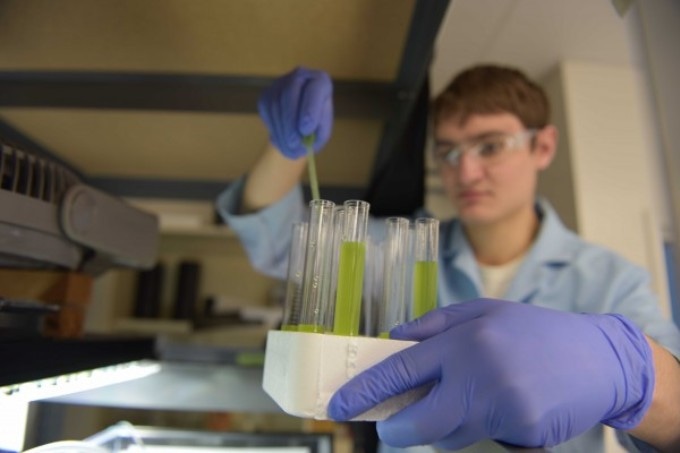Jan 16 2017
 PNNL biochemical engineer Mattias Greer examines algae samples for their suitability to make biofuel. Credit: Pacific Northwest National Laboratory
PNNL biochemical engineer Mattias Greer examines algae samples for their suitability to make biofuel. Credit: Pacific Northwest National Laboratory
A dozen glass cylinders containing a potential payload of bright green algae are widely exposed to hundreds of multi-colored lights that offer all the natural hues of sunlight. The small LEDs dim and brighten to imitate the constantly changing conditions of the outdoors. In order to further simulate a virtual cloud that passes overhead, chillers start and nudge the algae a little cooler.
As part of a new streamlined process, a new collaborative project worth approximately $6 million is using this climate-simulating laboratory system to quickly reduce several algae species into just a few that hold promise for making renewable fuels.
It is not a small task to discover algae species suitable for making biofuel. Scientists have tried to assess algae in test tubes, but they often found that lab results may not always reveal what happens when green goo is grown in outdoor ponds.
The Algae DISCOVR Project (Development of Integrated Screening, Cultivar Optimization and Validation Research) is exploring a new method that could minimize the cost and the time required to move promising algal strains from the laboratory into production. Scientists are hoping to identify four potential strains from at least 30 initial candidates at the end of the three-year pilot project.
Algae biofuel is a promising clean energy technology, but the current production methods are costly and limit its use. The price of biofuel is largely tied to growth rates. Our method could help developers find the most productive algae strains more quickly and efficiently.
Michael Huesemann of the Department of Energy's Pacific Northwest National Laboratory
The project was started this fall and is headed by PNNL, out of its Marine Sciences Laboratory in Sequim, Washington. The team includes three other DOE labs - National Renewable Energy Laboratory, Sandia National Laboratories and Los Alamos National Laboratory - and Arizona State University's Arizona Center for Algae Technology and Innovation.
Step by Step
The early work of the project relies on PNNL's Laboratory Environmental Algae Pond Simulator mini-photobioreactor system, also known as LEAPS, which imitates the frequently shifting lighting conditions and water temperatures that occur in outdoor ponds at any place on Earth.
This system is composed of glass column photobioreactors that function like small ponds and are positioned in rows to allow researchers to simultaneously grow various types of algae strains. Every row of LEAPS mini-photobioreactors is exposed to unique lighting and temperature regimens thanks to colored lights simulating the sunlight spectrum, as well as chillers, heaters, and heat exchangers - all of which can be altered every second.
First, the team will perform a multi-step screening process using PNNL's photobioreactors to grow all 30 algae strains under consideration and assess their growth rates. Those strains with suitable growth will be examined further to measure their protein, carbohydrate, and oil content, all of which could be used for making biofuels.
The algae will also be examined for valuable co-products such as the food dye phycocyanin that could make algae biofuel production more cost-effective. This first-phase study will also involve assessing how these strains could be resistant to harmful bacteria and predators that can kill algae.
Next, the scientists will try to find strains that produce 20% more biomass, or organic matter used for making biofuel, than two well-studied algae strains. Then the best-performing strains will be sorted to find individual cells suitable for producing biofuel, such as those that have more oil.
These strains will also be exposed to different stresses to support rapid evolution so they can, for instance, survive in higher temperature outdoor ponds experience during the summer.
Outside the Box
After passing these experiments, the remaining strains will be grown in big outdoor ponds in Arizona. Scientists will compare the algae growth in the outdoor ponds with the algal biomass output projected in earlier steps. For future studies biomass will also be produced from outdoor-grown algae.
Finally, the research team will further examine the final algae strains that grow outdoors to better understand how fast they grow in various lighting and temperature conditions. Then, this information will be entered into PNNL's Biomass Assessment Tool, which uses complete information from weather stations and other sources to discover the best possible places to grow algae.
The assessment tool will crunch numbers in order to help the scientists create maps that show the expected biomass productivity of every algae species grown in outdoor ponds at different locations in the U.S.
Scientists will make the information and strains public in the hopes that different algae companies and other scientists will think about growing the most productive strains detected by the project.
This project is supported by DOE's Office of Energy Efficiency and Renewable Energy.
Potential future work not included in this project could comprise converting harvested algae into biofuels, studying operational changes such as crop rotation to further improve biomass growth, and evaluating the economic costs and technical feasibility of making biofuel from algae selected through this process.
Lab Simulates Outdoor Algae Growth
Algae can be turned into renewable biofuel, which is why scientists want to discover an inexpensive, fast-growing strain of algae. Scientists at Pacific Northwest National Laboratory have developed a system to speed up this search. The unique climate-simulating system uses temperature controls and multi-colored LED lights to mimic the constantly changing conditions of an outdoor algae pond. By simulating outdoor climates inside the lab, the system saves researchers time and expense.